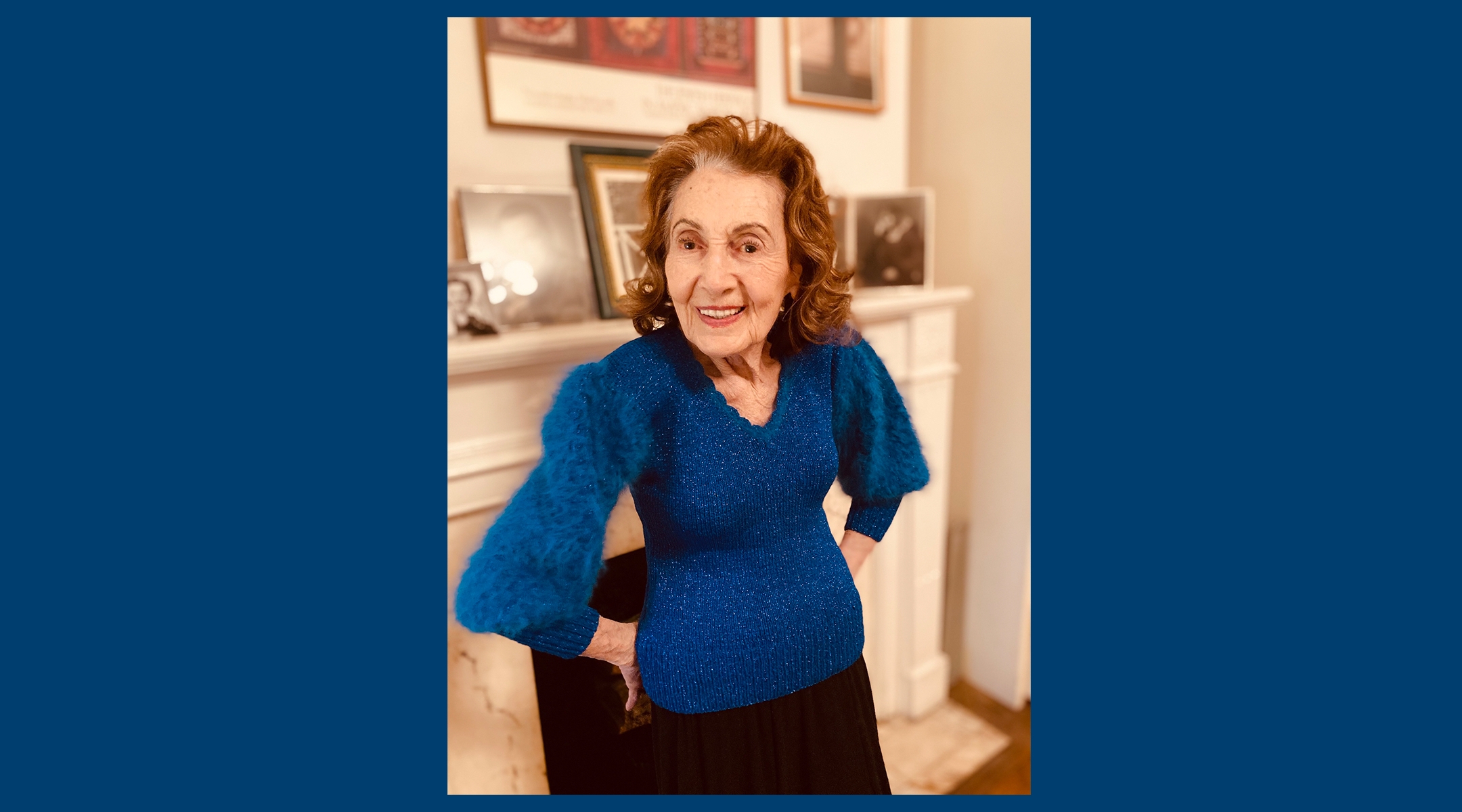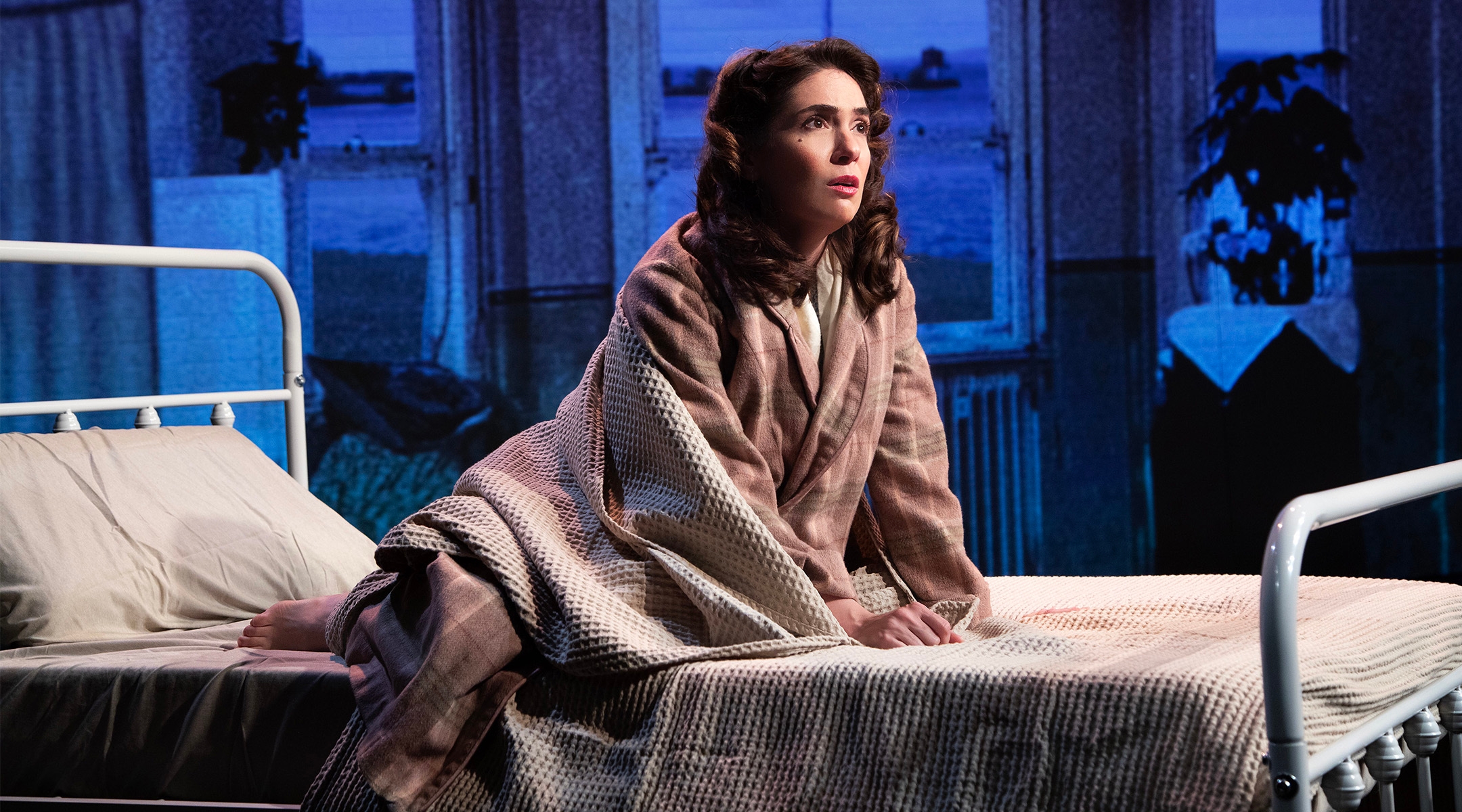(New York Jewish Week) — Holocaust survivor Helena Weinrauch survived imprisonment at three concentration camps and a forced death march. And yet the 99-year-old Manhattanite is, by all accounts, a force of nature. Time and again she has stared down unbelievable darkness. And yet she continues to exude a palpable joie de vivre.
In the immediate aftermath of World War II, while being nursed back to health in Sweden, which took in thousands of Jewish refugees, Weinrauch wrote a memoir, “A Will to Live.” Her aim was to remember things as they happened, and Weinrauch hoped that if she published the manuscript, her parents would come across it and find her.
The book was never published, and Weinrauch’s parents would never be found — her entire family was murdered by Nazis. But now, “A Will to Live” has been transformed into a one-woman play that premieres Thursday at the Chain Theatre on West 36th Street. Like the memoir, the play tells the story of Weinrauch’s years of survival: As a 20-year-old Weinrauch convalesces in a Swedish hospital, she recalls her experiences as a resilient teen who found herself alone in the world and determined to make it out alive.
“My story is not fiction,” Weinrauch wrote in a statement. “Unfortunately, this is my true story. I wrote it 61 years ago in German and Polish. Two years after I arrived in New York in 1949, I translated it into English. Two people read my story — one questioned the authenticity, the other wanted to know who wrote it. I was very hurt by their reaction and decided not to show it anymore. It remained dormant and unread because as the years passed, my outlook, mentality and perception changed. I would be tempted to correct mistakes, change style, phraseology etc. I was advised not to do it — all authenticity would be lost.”
Weinrauch’s story and personality have captivated many artists and writers over the years: She was among the survivors featured in “Reckonings,” a 2022 film about the complicated decision taken by Israel’s government to accept reparations from the German government in the early days of the state. She is also the subject of a 2015 documentary, “Fascination: Helena’s Story,” directed by Karen Goldfarb, a tale of how the then-octogenarian lived with the haunting shadows of her time in the concentration camps, and how she found joy in ballroom dancing.

Helena Weinrauch’s vivacity in the face of suffering has inspired many artists — including members of the knitting community, who were touched by Weinrauch’s tradition of wearing the same hand-knit blue sweater every Passover. (Karen Goldfarb)
Weinrauch took up ballroom dancing after her husband died in 2006 at 87. (The couple’s sole child, a daughter, had died of breast cancer the decade prior.) A 2019 New York Times profile describes the salvation she found in dancing: “When I dance, I forget what happened to me and it makes me feel for a few minutes or hours that I am happy,” Weinrauch told the paper. The article also quotes Steve Dane, who runs the Manhattan Ballroom Society, who describes Weinrauch as the society’s “Dancing Angel” who is “the last one off the dance floor.”
Weinrauch is also something of an icon in the knitting community. In 2019, Gail Dubov wrote a story for Moment Magazine about the sweater she wears at every Passover seder — a brilliant blue top gifted to her by a friend who had been forced to knit sweaters for Nazis’ wives in order to survive in the Lodz Ghetto. The story about the sweater and her resilience garnered international attention.
It also inspired another project, Knitting Hope, “which aims to share the ways knitting or knitted objects helped women to resist, remember those they lost, and find renewal after the horrors of the Holocaust,” its founder, Tanya Singer, wrote in a New York Jewish Week piece about the project.
“Her story, and her telling of that story, is incredible — her recollections are so fresh,” Kirk Gostkowski, the artistic director of the Chain Theatre who adapted “A Will to Live” for the stage, told the New York Jewish Week. The memoir “was written so close to the war, there’s no room for interpretation.”
RELATED: Why this Holocaust survivor wears the same hand-knit sweater every Passover
Gostkowski said he had wanted to turn Weinrauch’s story into a play for years before the project came to fruition. The pandemic kept pushing the process back. Gostkowski believes it was for the best: The delays allowed him to work with Weinrauch more extensively on the adaptation. Being in her late 90s, she wasn’t able to attend rehearsals, making this initial collaboration all the more important.
“We spoke quite a bit at the beginning [of the adaptation process] about what was important for [Weinrauch] to keep in,” he said. “She wanted to make sure that this wasn’t sanitized, that the hard parts are there. I think we’ve really successfully done that. Really, anything we left out was omitted for length and to make it a play. These are all her words. My only job here is to be the steward of her story. She’s a brilliant writer.”
Weinrauch was born in Dusseldorf, Germany, in 1924, and was only 9 years old when the Nazi party came to power in 1933. As a girl, she loved to dance and to sing; in a 2016 interview with Lilith Magazine, Weinrauch said she could “pound out simple melodies on the piano” by the time she was 4 years old. Her mother was a pianist and Weinrauch dreamed of dancing and performing, but these dreams were cut short.
Weinrauch describes this period of her life as one of “sadness, suffering and loss.” She initially escaped the Nazis with the help of an employer who forged new identification documents for her. Soon, though, she was noticed by an old classmate who turned her in. Weinrauch was sent to a firing squad, but a Nazi soldier she’d danced with at a ball stopped her from being shot. “A bullet is too good for you,” he sneered, sending her to the camps for further torture. That decision would save her life.
Weinrauch would go on to be confined in three separate concentration camps, interrogated by the Gestapo and left for dead in the snow outside Bergen-Belsen, saved by a British soldier who happened to notice that her body was still warm.
The play, and its cast and crew, are deeply dedicated to portraying Weinrauch’s story with the utmost accuracy. “Huge sections of the play are taken right from the memoir, so I’m literally saying her words,” Masha King, who stars in the show as Weinrauch, told the New York Jewish Week. “There’s nothing fictionalized. Honestly, if she was young enough she could do this play herself.”
The play is structured, like the memoir, as a series of memories. “We transport the set through visual projection mapping and sound design, none of which could have been possible without Greg Russ and David Henderson, our sound and projection designers,” Gostrowski said. “Everybody’s very emotionally invested in the show.”
King and Gostkowski said everyone on the production team is on the same page about the vision for the play. “Rick [Hamilton, the director] and I spoke about doing this in a way that really honors the way it’s written,” Gostkowski said. “It feels like a friend telling you about the worst time of their life. There’s an intimacy with the way that Helena wrote, and the way Masha portrays that is outstanding.”
To King and Gostkowski, the play feels vital and important. The rise in global antisemitism has them both on edge — “It’s never really gone away, but it’s so prevalent right now,” Gostkowski said — but that’s not the only driving force.
“Anything that has to do with the Holocaust is always relevant,” said King, a Jewish immigrant from Ukraine who previously toured the country performing as Anne Frank in an educational adaptation of her diary. “It’s more than just a Jewish issue… We still face antisemitism, yes, but also anti-any-group-of-people. [Helena] is a child — she’s 16 when it happens. She doesn’t even talk about religion in her memoir, other than the fact that she was Jewish and that meant she could no longer live as a human being.”
“If you have an oppressive regime, it will oppress everyone,” King added, noting how gays, Romani people, people with disabilities and countless others were targets of Nazi hatred. “I welcome antisemites to come see the show. Please, come. If we could influence one person to think about the humanity of others, we’ve done a great job.”
Weinrauch herself concurs. “I hope that my story may bring hope and love into the lives of those who hear it,” she said.
“A Will to Live” will be performed at the Chain Theater (312 West 36th St.) through Sept. 16. For tickets and info, click here.
The New York Jewish Week brings you the stories behind the headlines, keeping you connected to Jewish life in New York. Help sustain the reporting you trust by donating today.





